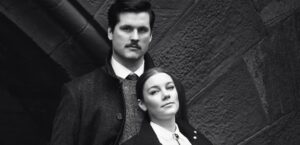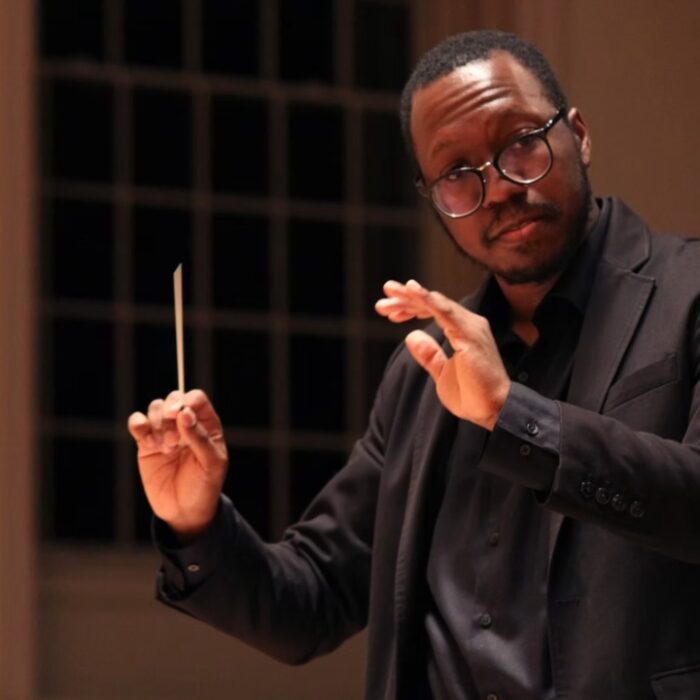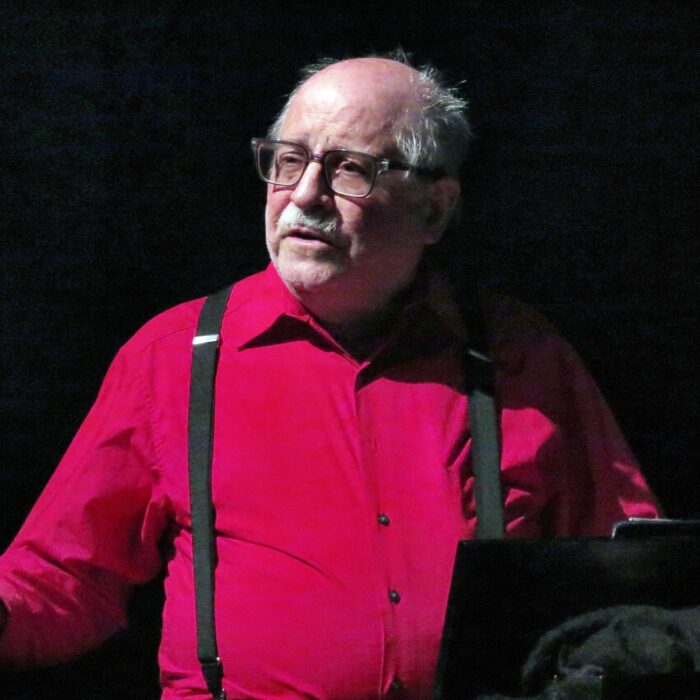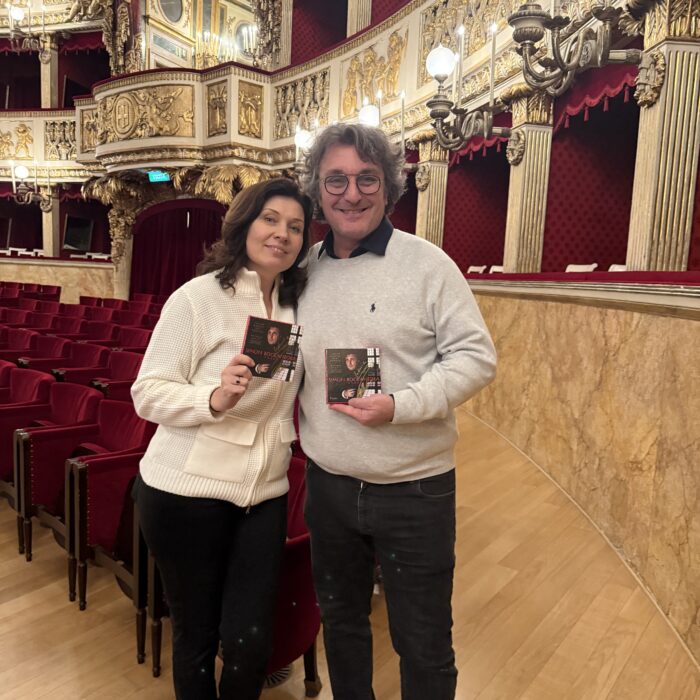
Q & A: Cadie & Jonathan Bryan on Living Life & Art Together in Piedmont Opera’s ‘Pagliacci’
By David Salazar(Photo Credit: Daniel Welch)
If you had to boil down the one constant connecting thread of opera, romance would likely be at the top of that list of possibilities. Simply put, what connects us to the greatest of operas is usually a great love story. Think “La Bohème,” “La Traviata,” “Le Nozze di Figaro,” “Tristan und Isolde,” “Der Rosenkavalier,” etc. Romance is almost always in the air when you go to the opera.
That will be doubly the case at Piedmont Opera when its production of “Pagliacci” opens on Nov. 8, 2025. The famed verismo opera’s central relationship between Canio and Nedda is a case of frustrated love, but in the background, Nedda has given her heart to one Silvio, and halfway through the piece, Leoncavallo gave the couple one of the most ardent love duets ever written. In Piedmont Opera’s production, those two roles will be performed by real-life partners Cadie J. Bryan and Jonathan Bryan, adding an extra layer to the intensity of the moment.
The Bryans are no strangers to playing star-crossed lovers on stage. They performed as such in “The Sound of Music” and “Oklahoma.” They met at Louisiana State University in Baton Rouge and then went to Indiana University Bloomington together. Since then, they have embarked on major careers around the U.S.. Cadie Bryan’s upcoming season includes performances at Bard Summerscape, The Atlanta Opera, and Pensacola Opera. She is also slated to cover “The Amazing Adventures of Kavalier and Clay” in February at the Metropolitan Opera after having done so in the company’s inaugural run of the production this fall.
Meanwhile, Jonathan Bryan will appear with Rapides Symphony Orchestra, Pensacola Opera, and will also be covering in “The Amazing Adventures of Kavalier and Clay” at the Metropolitan Opera.
OperaWire spoke to the New York-based couple about their careers, the power of singing together, and what they hope audiences take away from this upcoming production of “Pagliacci.”
OperaWire: What excites you most about this production of “Pagliacci” at Piedmont Opera?
Cadie Bryan: I would love to be an audience member for this one. It’s performed on a thrust stage in a really cool and unconventional space in which the audience will be right in the middle of the action. The entire space is set up to feel like a circus tent, and without “Cavalleria,” the short length of “Pagliacci” allows for some fun pre-show activities and a lengthy intermission allowing people to have (and actually finish) a beverage and a conversation with friends before the second act. It’s also a very exciting role debut for me!
Jonathan Bryan: The acting talent of this cast! Verismo opera requires not only significant vocal talent, but deep emotional connection from the singers. Every member of this cast is brave enough to allow a level of vulnerability that is rare, and the result is a gripping and truly powerful night of theater.
OW: How does being a couple help you in performing the role of lovers on stage. In what other operas have you been afforded that opportunity?
CB: Playing lovers requires trust and vulnerability, and can sometimes take a lot of work or even feel uncomfortable with professional colleagues. Leoncavallo wrote one of the hottest love duets ever, and the pressure to sell that to an audience feels so much more manageable when your counterpart is someone you know intimately and trust unconditionally. We were technically lovers in “The Sound of Music” in 2023, but that’s the G-rated, wonderfully wholesome version that couldn’t be further from “Pagliacci!” I think the closest we’ve come to Silvio and Nedda is probably Don Giovanni and Zerlina in undergrad.
JB: Trust and familiarity. We have an intimate and almost instinctual understanding of each other — how we move, emote, and even breathe. This understanding allows us to make choices that are beneficial for both of us: choices that are true to character without upstaging each other. We can push the envelop without worrying about crossing a line, and we can go home every night and discuss how to further elevate our scene for next time.
OW: What is the best part about performing with your life partner?
CB: Every job we get is a win for our bank accounts, but every job that isn’t together is another month or two that we have to be apart. The fact that we can both make a living this way and not have to do it across the country from one another is such a comfort and a morale boost. It’s also great to have a front row seat to watch my favorite baritone do his thing.
JB: Getting to see other people witness Cadie’s brilliance on stage! I’ve known for nearly 15 years how talented and undeniable she is as a performer, and nothing brings me more joy than witnessing the rest of the world becoming aware of her immense gifts.
OW: What was your first experience performing together?
CB & JB: We were Guiglielmo and Despina in “Così fan tutte” as undergrad students at LSU in 2013—the same year we got together!
OW: How did each of you decide that you wanted to engage in a career in opera?
CB: I didn’t know what opera was until I entered LSU’s music education program after some success in my high school’s musicals. The program boasted a 99 percent job placement rating, but I am sorry to say that I absolutely hated my time in that degree! It took one fall student performance of “La bohème” for me to fall in love with opera, but I didn’t feel like I was allowed to consider it as a career option. After almost quitting the music school entirely, my eventual mentors at LSU, Dennis Jesse and Michael Borowitz, convinced me that I had what it takes to try a performance degree. I joined the studio where I met Jonathan, got a role in an opera in my third year, and I never looked back. I remember Lisette Oropesa came to do an alumni recital and talk-back, and she said that, statistically, about two percent of us would have a career. Jonathan and I looked at each other and decided, in that instant, that we had to be that two percent
JB: I originally wanted to be a singer-songwriter. I learned to play guitar, wrote a few songs, and quickly realized that my songs sucked! So, I started pursuing opportunities to sing really good music written by people much more talented than me. Choir, musicals, pop shows. My high school choir teacher sat me down one day and told me it would be a shame if I didn’t give a career in music a shot. He told me a classical degree in voice would give me the most opportunities, so that’s what I pursued. I thought I’d go on to grad school for music business and join the record industry. Early on though, I found myself in the chorus of Rossini’s “La Cenerentola” to fulfill a degree requirement, and I was blown away by the vocal athleticism of the principals. Not only that, but the show was FUNNY. I had never imagined that opera could be that entertaining. From then on, it was opera or bust for me!
OW: What are some of the greatest challenges you have overcome as an artist and how did those experiences help you grow as artists?
CB: I think the financial burden of being an artist is the hardest pill to swallow. We face so many challenges every day, from as broad as the desperate state of the industry to as granular as what’s in this ready-made salad that could wreck my passaggio in today’s rehearsal if the GD decides to pop in. I think the toughest part of the whole thing is keeping the focus and keeping the faith. The ladder we climb is long—longer than 20-year-old-me ever anticipated—and on every rung is a total perspective shift. Staying focused through the noise means staying physically healthy, mentally and emotionally tough, and vocally ready at all times—all of which, hilariously, costs money. It’s harder than it looks when you have to drop an entire paycheck on wrist surgery, you just bombed an audition, the restaurants aren’t hiring, and you don’t know where September 1st rent is coming from before making it to the gig on the 27th. I don’t know that it was always this difficult, but the work itself always keeps us coming back for more, and I think we wear it as a badge of honor—or maybe a bulletproof vest!
JB: To me, the greatest challenge is maintaining my mental fortitude through the ups and downs of the career. If you’re one of the lucky ones who gets some big opportunities right out of the gate, you come to expect that your trajectory is going to be a straight line climbing ever upward. This is almost never the case, and pretty much everyone in this industry will have experienced some peaks and valleys by the time they reach their mid-30s. I was flying high when COVID hit in 2020. The pandemic killed my momentum, and I was left to grapple with the reality that inertia was doing all of the heavy lifting for me. I emerged from shut-down with my confidence shot. I realized my self-worth had been built upon a shifting foundation of opportunity and public recognition. One day, while warming up for a performance, I realized that I couldn’t remember the last time singing made me feel anything but dread. It was a kick in the pants, and I committed to making a change. Over the past few years, I’ve worked hard to rebuild my confidence on my own terms, independent of the feedback of industry professionals and critics. It’s been a tough road, but it has taught me that we all have more agency than we think. I can love myself without permission, no one is going to be ashamed of me if I beef a high note in an audition, and I can (and should) make art without a care in the world for who is going to see it. I’ve learned that as long as I can hook back into the joy of self-expression, I can recover from any blow this industry might deal me.


